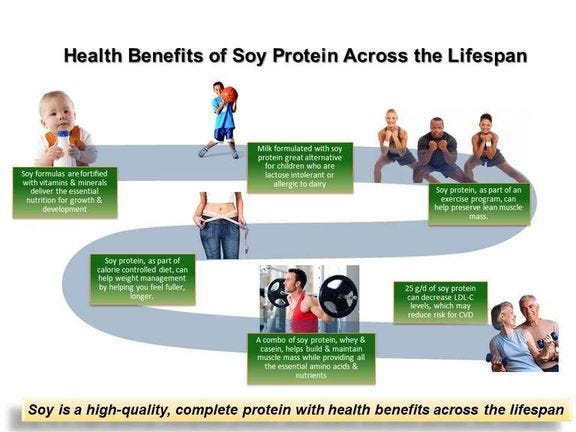A complete protein with a stable and reliable supply and potential cost savings for manufacturers, soy continues to be an important protein source in products ranging from infant formula to everyday food options.
January 13, 2016

Regardless of a person’s age, protein is a key nutritional component and is crucial in the diet, throughout infancy, adolescence, adulthood and during aging. Consumers value ingredients like protein for health benefits for themselves and their loved ones, and are making food and beverage choices based on the inclusion or absence of specific ingredients. The International Food Information Council Foundation’s (IFIC) 2013 and 2014 Food & Health surveys found that 58 percent of consumers now consider protein when making decisions about food purchases.1 Consumers are becoming more aware of how ingredients can help support their health, and continue to seek out healthier food and beverage options to reach their desired fitness and weight goals.
Protein has broad consumer appeal, including support of healthy growth and development, weight management and satiety, muscle growth and recovery for active adults and the aging population. The spectrum of benefits from specific sources of protein has been demonstrated in research conducted over the last 50 years. Specifically, including soy protein in the diet has been shown to support health throughout an individual’s life cycle. The health effects of soy protein have been studied more than all other vegetable sources and soy is the only widely available, complete protein source. In addition, soy is a leading protein option because of its stable and reliable supply with potential cost savings for manufacturers. It is also environmentally sustainable, requiring less land, energy and natural resources to produce compared to other commonly consumed protein sources.
Protein Needs for Targeted Consumers
Supports healthy growth and development early in life
Dietary protein is essential at any age, including infancy and early childhood for support of healthy growth and development. DuPont ™ Danisco® Supro®Soy Protein has served as the basis for infant feeding for more than a century. Soy-based infant formulas are safe and effective for infants who cannot be fed breast milk or dairy-based infant formulas and may be used to provide nutrition for normal growth and development. Soy protein-based formulas have been shown to meet a specific consumer need to provide the basis of formulas developed for infants who are lactose intolerant, have an allergy to cow’s milk or suffer from galactosaemia.2 In addition, some parents choose soy protein-based formulas for religious, ethical or other considerations that stipulate the avoidance of cow’s milk-based formula.
Inclusion of lean, vegetable protein also can contribute to diet quality of children and adolescents. A recent study conducted by University of Missouri, in collaboration with DuPont Nutrition & Health, found consumption of soy protein-rich afternoon snacks resulted in reductions of appetite throughout the day, delayed the request for the next meal and improved overall diet quality in teens compared to other snack options.3 With 91 percent of Americans consuming one to two snacks every day, protein-packed snacks are topping grocery lists nationwide.4 A common way to include high-quality soy in the daily diet of young people is by consumption of fortified soymilk. This source serves as an alternative often used for children and teenagers who are lactose intolerant or allergic to dairy.
Supports a healthy lifestyle for adults
For adults, soy protein has a number of specific benefits spanning different areas. Since the average adult workweek can clock to be more than 50 hours, eating healthy and making the right food choices can become a major obstacle for most. Limited time may then lead adults to look for foods that keep them feeling fuller longer to help support particular health goals. Soy protein addresses this struggle as it promotes satiety and allows consumers who are looking to lose or maintain their weight to have convenient sources of high-quality protein that provide additional health benefits.
Across all consumer segments, there is a tremendous value placed on convenience to support today’s busy lifestyles. Convenient nutrition in the form of functional beverages, bars and meat substitutes remains prominent as components in either easy on-the-go meals or healthy recipe additions for family meals. A diet rich in high-quality protein is gaining support as a successful strategy to reduce fat mass while also preserving lean body mass during weight loss.5,6 When adults consume soy protein as part of a calorie-controlled diet, it also can aid with weight management by promoting satiety. As part of a healthy diet, replacing carbohydrates with protein also has been shown to support certain aspects of heart health, such as blood pressure. In addition, more than 100 studies have demonstrated soy protein’s cholesterol-lowering effects, as part of a diet low in cholesterol and saturated fat, leading to clinically relevant reduction in risk of the No. 1 cause of death, globally7. In fact, 13countries have approved a health claim related to soy’s ability to help reduce the risk of coronary heart disease.
Protein is an important nutrient for muscle health, growth and recovery. A combination of soy protein, whey and casein actually accentuates the positive attributes of each protein source, and recent research suggests that combining proteins that have different absorption rates, such as soy protein, whey and casein, can prolong delivery of amino acids to the muscle.7 The most recent findings from a study of a blend of proteins including Supro Soy Protein combined with whey and casein found long-term use of a soy-dairy protein blend supplement may enhance muscle gains when provided for three months along with participation in a resistance exercise program.8
Emerging research to support health during aging
Protein plays a pivotal role in support of health as a person ages. However, as we age, protein consumption declines due to sensory challenges. As lifestyle behaviors contribute to good health, especially as a person ages, protein consumption remains important. Well-established health effects of soy protein include heart health, due to effects of lowering the “bad" cholesterol without negatively impacting the “good" cholesterol. An emerging area of concern and understanding is the importance of muscle health in maintaining mobility and function within this population. Intake of high-quality protein is an important strategy, along with physical activity, to attenuate age-related muscle loss or sarcopenia.
New evidence supports the role soy protein could play in effective lifestyle interventions for the aging. Onset of age-related disease becomes a greater concern to this segment. For example, nonalcoholic fatty liver disease (NAFLD) is a major public health issue and has a high prevalence globally (11 to 46 percent).9 Non-Alcoholic Fatty Liver Disease (NAFLD) is characterized by the buildup of fat (over 5 to 10 percent by weight) in the liver and is associated with insulin resistance, metabolic syndrome and obesity.10 Soy protein has been shown to decrease the liver fat deposits over time in animal models and reduce other markers of liver damage.11 Additionally, soy protein intake has been observed in clinical studies to exert positive effects on renal function, plasma lipids, blood pressure and glucose control. Soy protein intake, at appropriate levels, could be considered a viable source of protein for those concerned with kidney health.12

Feeding the Protein Appetite
Soy protein offers a variety of benefits for consumers throughout their lifespan, depending on the consumer’s dietary needs and lifestyle. Soy protein specifically offers a multitude of benefits and can be consumed to support weight management, muscle growth recovery and healthy growth and development starting from the earliest of life stages.
As consumers continue looking for ways to improve their overall health and wellness goals, having access to high-quality proteins like soy is important to achieve these goals. Research supports soy protein as a high-quality protein that can be used across the lifespan to promote health benefits. These benefits include cardiovascular, muscle, weight management and some emerging benefits related to liver health. Soy protein has been, and continues to be, an important protein source in products ranging from infant formula to everyday food options.
Promising Future for Protein
DuPont Nutrition & Health understands consumer needs by gathering consumer insights through robust research that dives into the everyday behaviors of various consumer segments, which allows us to then share that knowledge and expertise with manufacturers to target specific consumer needs. The application development and scientific research conducted by DuPont Nutrition & Health can help support successful product development. As food manufacturers look to consumer trends for guidance when developing new products, functionality and health benefits remain at the forefront of meeting specific consumer demands and successful new product launches.
Mark Cope, Ph.D., received his doctorate in nutrition sciences from the University of Alabama at Birmingham. He is currently a research scientist on the global nutrition science team at DuPont Nutrition & Health, where he manages clinical nutrition studies and works closely with counterparts at other food companies. Cope has worked in nutrition research for more than 15 years and has experience in several areas related to nutrition science. He has been a member of the American Society for Nutrition for 6 years, The Obesity Society for 10 years, and also has published several peer-reviewed papers and book chapters related to nutrition and obesity.
References
1. IFIC 2013 & 2014 Food & Health Survey.
2. ESPGHAN Committee on Nutrition. J Pediatr Gastroenterol Nutr. 2006.
3. Leidy et al. J.Nutr. doi: 10.3945/jn.115.21209.
4. Nielsen 2014 Survey.
5. Sites et al. Fert & Ster. 2007.
6. Christie et al. Am J Obstet Gynecol. 2010.
7. Reidy et al. J Nutr. 2013;143(4):410-6.
8. FASEB J. 2015;29(Suppl 1)129.5.
9. Berlanga A et al. Clin Exp Gastroenterol. 2014;7:221-23.
10. Nonalcoholic Steatohepatitis, National Institute of Diabetes and Digestive and Kidney Diseases.
11. Cain J et al. Horm Metab Res. 2011;43:774-781.
12. Miraghajani MS et al. Diabetes Care. 2012;35(10):1981-5.
About the Author(s)
You May Also Like




.png?width=800&auto=webp&quality=80&disable=upscale)